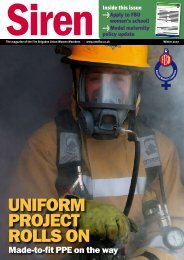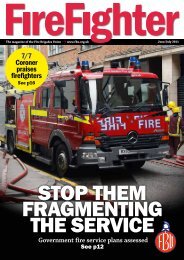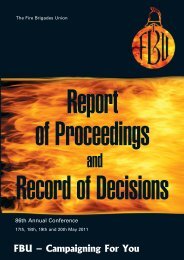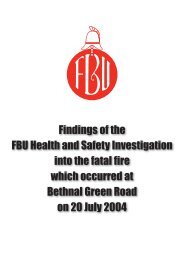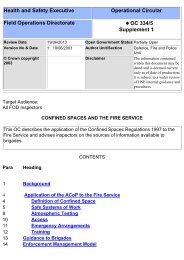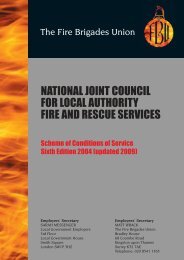Draft London Safety Plan 2010/2013 - Fire Brigades Union London
Draft London Safety Plan 2010/2013 - Fire Brigades Union London
Draft London Safety Plan 2010/2013 - Fire Brigades Union London
Create successful ePaper yourself
Turn your PDF publications into a flip-book with our unique Google optimized e-Paper software.
annual efficiency savings of £110m by the end of<br />
<strong>2010</strong>/2011. This equates to £20m for LFEPA over three<br />
years.<br />
Our focus on efficiency has been enhanced over the past<br />
year through the introduction of a more strategic<br />
approach to budget review. We have conducted<br />
efficiency reviews of all departments in the organisation,<br />
and also conducted some thematic reviews of areas in<br />
which we considered further efficiencies could be<br />
identified. We intend to build on this approach for future<br />
years by fully integrating efficiency into our performance<br />
management framework and to ensure that delivery of<br />
value for money services is our key objective. This will<br />
require full evaluation of the effectiveness of our activities,<br />
including integrating customer, user and stakeholder<br />
engagement and feedback into our planning.<br />
It is important to remember that as the capital city and as a<br />
leading world financial and business centre, <strong>London</strong> faces<br />
distinctive challenges, including a higher risk of terrorist<br />
attack than any other city in the UK. To meet this<br />
challenge, the Brigade spends in the region of £34m on<br />
specific resilience work each year with only a very small<br />
proportion (£4m) funded by central government. Our<br />
work to keep <strong>London</strong> safe helps to keep the UK safe. We<br />
believe that the grant funding regime for <strong>London</strong> should<br />
be changed in a way that recognises that the resilience<br />
and security costs associated with the capital city are met<br />
by central government rather than the <strong>London</strong> tax payer.<br />
Our co-ordination role in responding during emergencies<br />
has grown considerably over recent years. One of our key<br />
priorities is reducing the number of fires that occur and<br />
preventing the tragic consequences that fires can bring.<br />
We have calculated that since 2004-05 the reduction in<br />
the number of fires in <strong>London</strong> each year has delivered<br />
savings in economic cost to <strong>London</strong> of over £92m – this<br />
figure is calculated in terms of the damage, human<br />
suffering and criminal justice system costs that each fire<br />
causes.<br />
service. The funding formula that decides the distribution<br />
of that overall funding between fire and rescue authorities<br />
is also being reviewed.<br />
We believe that the funding formula should be changed<br />
in a way that recognises that the resilience and security<br />
costs associated with the capital city are met by central<br />
government rather than the <strong>London</strong> tax payer.<br />
BETTER VALUE<br />
We expect the next few years to be challenging financially<br />
with reductions in future government spending and the<br />
ongoing economic uncertainty which is likely to affect<br />
both interest and inflation rates. Our strategic budget<br />
review process has been designed to improve our ability<br />
to plan for this uncertain future and ensure that budgeting<br />
is focussed on the longer term strategy as well as the<br />
immediate need for savings.<br />
A key part of the uncertainty for the future concerns the<br />
grant settlement beyond the current funding period<br />
which ends next year. We expect at best a cash freeze<br />
and probably a reduction in overall funding for the fire<br />
41





